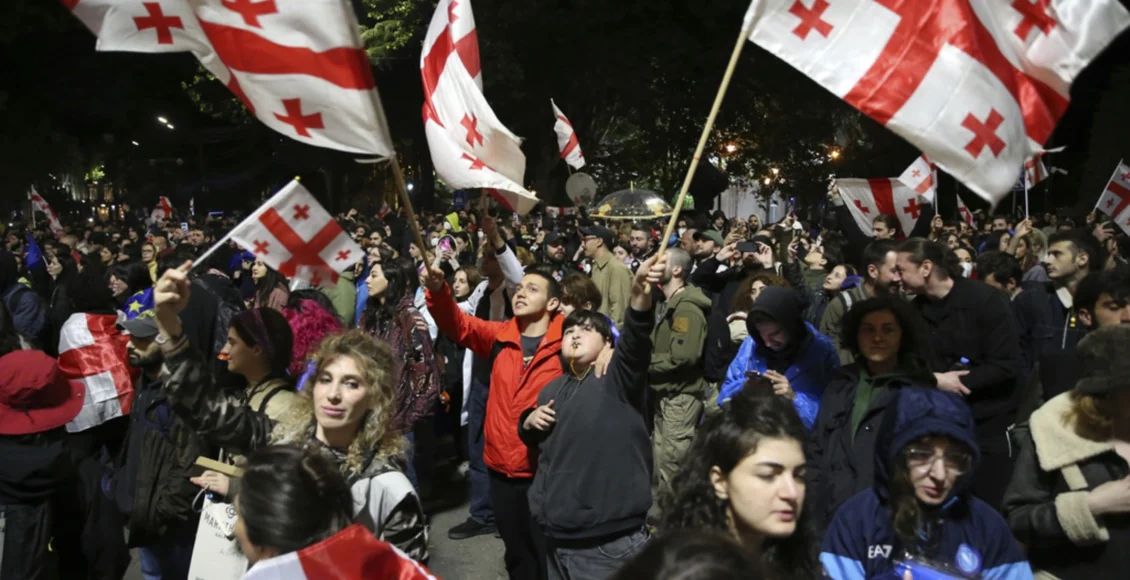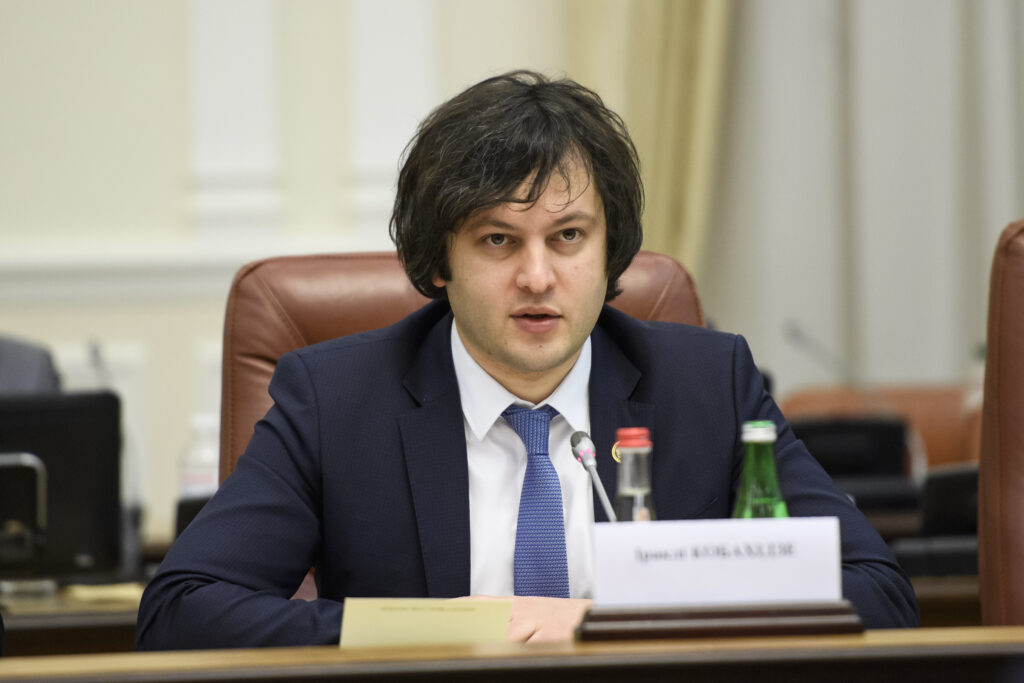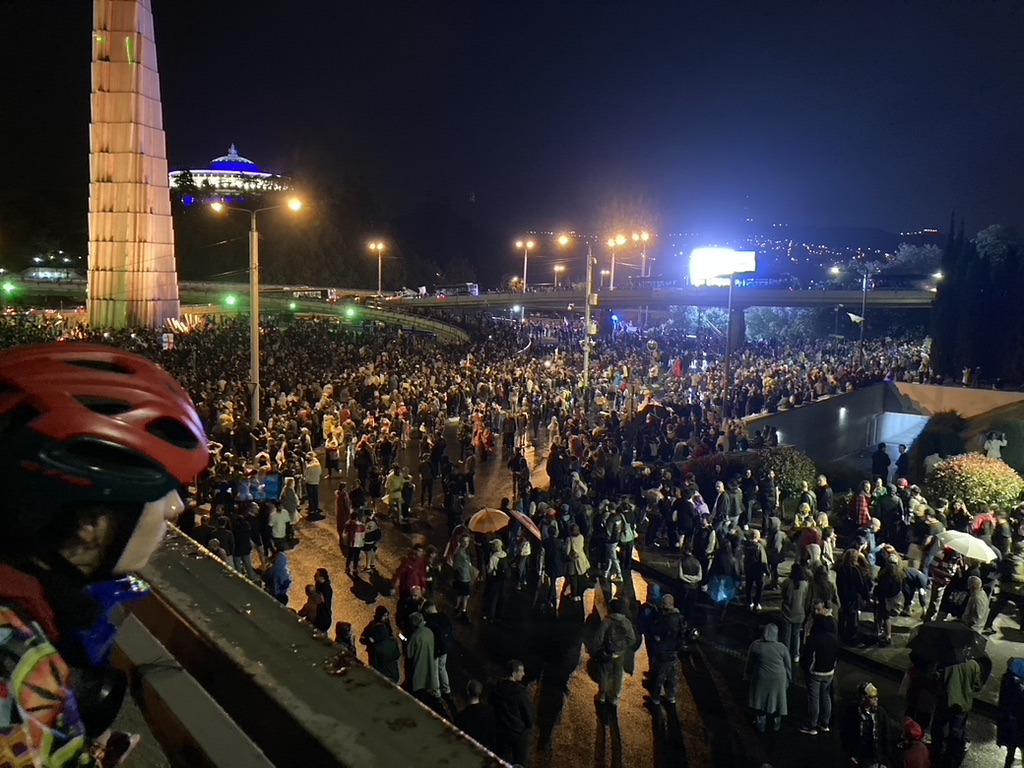Moscow’s Grip is Tightening, but Georgia Won’t Give in Without a Fight

“FREEDOM CANNOT BE BEATEN INTO SUBMISSION!” reads the bold, black, and resolute marker on a Georgian protestor’s homemade sign, the English lettering imploring the West and international community to lend their support. After months of massive demonstrations, Georgia’s protestors have received less media attention but have not given in to fatigue, despondency, or increasingly intense government repression. This most recent protest movement began after the Russia-friendly Georgian Dream party’s “landslide” victory in the October 2024 parliamentary elections was stained by allegations of election fraud. Described by the EU as involving “numerous and serious electoral violations” and denounced by several NGOs, the seemingly rigged elections signalled Russian interference and proved indicative of a resurgence of authoritarian politics in Georgia. With recent legal measures restricting civil society and freedom of the press, there is no question Georgia’s already weak democratic principles are being further eroded.
However, this grassroots push for democracy should not be brushed aside as just another insignificant attempt to break free from decades of illiberal democracy, which has usually resulted in the replacement of one authoritarian regime with another. This time, protesters’ demands are broader and more systematically focused than before. Whereas previous protest movements mainly targeted specific leaders and regimes, protecting democratic principles and institutions while securing Georgia’s alignment with the West is at the forefront of this one. Furthermore, this protest movement is fuelled by sustained and widespread support, transcending regional divides, generational gaps, and class differences. Given recent anti-democratic legislative measures, the ability of the Georgian people to democratically express themselves is slowly disappearing. Unless the international community takes more decisive action in supporting their popular uprising now, the Georgian Dream party will continue to stifle opposition and dismantle the country’s democracy.

Granted, pessimism about a democratic future in Georgia isn’t baseless. Due to its strategic geopolitical location, conflict between the country’s pro-Russian and pro-Western elements has often come at the expense of upholding democratic principles. In recent decades, the country has swung between semi-authoritarian regimes backed by pro-Russian or pro-Western forces, a difficult environment for a strong democratic tradition to develop. After a violent coup in 1992, Georgia’s first post-Soviet democratically elected president, the populist strongman Zviad Gamsakhurdia, was replaced by the Russian-backed Eduard Shevardnadze. Although not as despotic as his brazenly illiberal predecessor, Shevardnadze was forced to resign after the 2003 Rose Revolution, in which Georgians protested his corruption and election fraud. However, this moment of optimism quickly became a prime example of Georgia’s failure to fully root out lingering authoritarianism, as Shevardnadze’s pro-Western successor Mikheil Saakashvili was similarly repressive. Since Saakashvili left office in 2013, the Georgian Dream party has remained in power, gradually entrenching itself in the political establishment, and, more recently, accelerating its authoritarian tactics.
Georgia never had a stable democratic foundation to begin with, but the government is stifling this most recent push for Western alignment in a blatantly authoritarian way. While the 2003 Rose Revolution was not violently repressed at all, Georgian Dream’s response to the current protests has been reactionary violence and prolonged systemic repression in the form of legislation designed to eat away at Georgia’s democratic institutions. It is these attacks on Georgia’s foundational democratic principles, which shamelessly defy the will of the vast majority of the population, that give these current protests such a feeling of urgency.
With nearly the entire opposition boycotting parliament and refusing to recognize the current government in protest of the election fraud, Georgian Dream has been able to pass laws that target protestors and weaken democratic institutions. On top of harsh crackdowns on protests and the imprisonment of opposition leaders, one of the most overtly repressive pieces of legislation was last year’s “Foreign Agent” law, which designated all Georgian NGOs with at least 20% of their funding coming from outside the country as foreign agents. The law allows for intensified government oversight, pressure, and further legal action against Georgian civil society (90% of which receives funding from abroad), significantly weakening the population’s ability to hold their government accountable and ensure civil liberties. The law’s more immediate effect was stifling opposition to the Georgian Dream during the October parliamentary elections, demonstrating their use of manipulative electoral tactics to gain power. The law’s passing was also a major blow to the Georgian population’s aspirations for Western alignment, of whom 79% favour EU membership. Repelled by the repressive measure, Georgia’s bid to join the EU was blocked, and its entry process has been postponed by Georgian Dream until 2028.
Additionally, millions of dollars of aid from the US and EU have been paused. Another overtly antidemocratic law passed by the one-party parliament eliminates the requirement of NGO participation in policy-making, further restricting civil society’s ability to ensure government transparency and respect for human rights. Unquestionably, the Georgian Dream party’s recent legislation is designed to consolidate power while suppressing the opposition’s ability to hold them accountable.

However, the Georgian people have responded to this institutional repression with stronger calls for systematic change. Due to the recent legislation, the movement has grown to be primarily focused on defending the democratic principles the Georgian Dream has been trying to strip away. According to a March 4 live blog by Civil Georgia—a website dedicated to documenting current events in the country, particularly political repression and the struggle for democracy—what began as protests against Georgian Dream’s 2024 “U-turn” away from the EU has since widened into a “broader resistance” demanding more comprehensive and “significant changes in the country”. In response to police brutality, harsh measures aimed at suppressing protests, the imprisonment of almost 500 protestors, and slogans like “WE RESIST REPRESSIONS!” and “HELLFIRE TO THE OLIGARCHY” have emerged as rallying cries of the resistance.
The unchecked institutionalization of authoritarian structures, which completely ignores the consensus of Georgia’s firmly pro-democratic population, is what makes this moment stand out in Georgian history. Faced with the impending reality of perpetual illiberalism, though, Georgians have responded with a stronger and more united call for democracy than ever before. Without meaningful international support, though, the protests could weaken under the weight of increasing state repression. Time is running out for Georgia, but it is not too late to ensure one of the most crucial and inspiring movements for democracy in our lifetime will not be waged in vain.
Featured Image: Georgians protest the “Foreign Agent” bill outside the parliament in 2024. Protests against the law “on foreign influence” by Jelger Groeneveld, licensed under CC BY 2.0.
Edited by David Amm.
